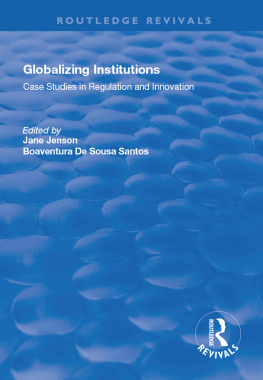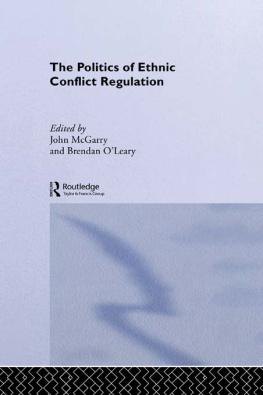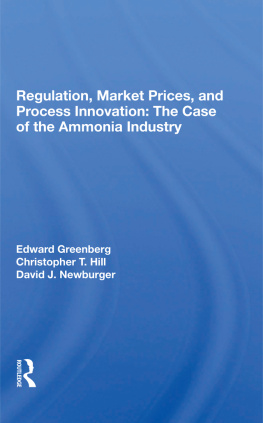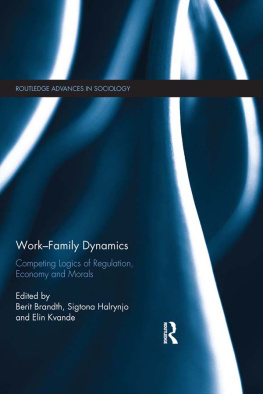GLOBALIZING INSTITUTIONS
Globalizing Institutions
Case studies in regulation and innovation
Edited by
JANE JENSON
Department of Political Science
University of Montreal, Canada
BOAVENTURA DE SOUSA SANTOS
School of Economics
University of Coimbra, Portugal
First published 2000 by Ashgate Publishing
Reissued 2018 by Routledge
2 Park Square, Milton Park, Abingdon, Oxon OX14 4RN
711 Third Avenue, New York, NY 10017, USA
Routledge is an imprint of the Taylor & Francis Group, an informa business
Copyright Jane Jenson and Boaventura de Sousa Santos 2000
All rights reserved. No part of this book may be reprinted or reproduced or utilised in any form or by any electronic, mechanical, or other means, now known or hereafter invented, including photocopying and recording, or in any information storage or retrieval system, without permission in writing from the publishers.
Notice:
Product or corporate names may be trademarks or registered trademarks, and are used only for identification and explanation without intent to infringe.
Publishers Note
The publisher has gone to great lengths to ensure the quality of this reprint but points out that some imperfections in the original copies may be apparent.
Disclaimer
The publisher has made every effort to trace copyright holders and welcomes correspondence from those they have been unable to contact.
A Library of Congress record exists under LC control number: 00132594
ISBN 13: 978-1-138-72082-4 (hbk)
ISBN 13: 978-1-315-19494-3 (ebk)
Contents
Jane Jenson and Boaventura de Sousa Santos
Harry W. Arthurs
Ruth Buchanan
Sally Engle Merry
Maria Celia Paoli
Gay W. Seidman
Lucie White
Barbara Yngvesson
E. Fuat Keyman
Jane Jenson
Boaventurade Sousa Santos
Harry W. Arthurs
Osgoode Hall Law School and Department of Political Science
York University, Canada
Ruth Buchanan
Faculty of Law
University of British Columbia, Canada
Jane Jenson
Department of Political Science
University of Montreal, Canada
E. Fuat Keyman
Department of Political Science and Public Administration
Bilkent University, Turkey
Sally Engle Merry
Department of Anthropology
Wellesley College, USA
Maria Celia Paoli
Department of Sociology
University of So Paulo, Brazil
Boaventura de Sousa Santos
School of Economics
University of Coimbra, Portugal
Gay W. Seidman
Department of Sociology
University of Wisconsin-Madison, USA
Lucie White
Law School
Harvard University, USA
Barbara Yngvesson
School of Social Science
Hampshire College, USA
This book has its origins in a project sponsored by the Canadian Institute for Advanced Research, through its Programme on Law and the Determinants of Social Ordering. The progamme was formally concluded in July, 1996. However, a number of members of the programme with several scholars recruited specifically as contributors to this book continued the work thereafter with the financial support of the Institute. The editors wish to express their appreciation for the support provided, and for the efforts of Liora Salter, the last Director of the Program.
JANE JENSON AND BOA VENTURA DE SOUSA SANTOS
Globalization is a word which trips easily off many lips. It is commonplace for everyone from journalists, business people and political leaders to ecologists and other social movement activists to frame their behaviour in terms of global events and processes. Despite, or perhaps because of, the term being so prevalent, globalization as both a popular idea and a concept lacking specificity. Moreover, its influences are usually asserted rather than analysed.
The starting point of this volume is not to dismiss the notion of globalization. We do not share the predisposition of those who, in the face of complexity and lack of specificity, choose to emphasize continuities in social relations and the on-going central role played by the national state, for example (Hirst and Thompson 1996). Rather, all the authors in this volume share two premises which place global processes at the heart of their analyses. One premise is that profound reconfigurations and adjustments in social relations are occurring as a result of a shifting of spatial relations. A variety of social relations now stretch across space in novel ways (Giddens 1990; Robertson 1992; Castells 1996; Featherstone, Lash, and Robertson 1997). Because social relations always involve the deployment of power, a second premise is that such shifts will provoke changes in the patterning of unequal power relations. Globalization means, in other words, that there are losers as well as winners, just as there have been at every other moment in history. If any consensus exists about the proper responses to current conditions, this agreement is often no more than the expression of the hegemony of the winners.
If all the authors in this volume accept that we are experiencing changes that go under the label of globalization, they do not conceptualize the phenomenon as a single thing or single process. A starting point for our analysis is that there are many globalizations, and the noun should most properly be used in the plural. Moreover, as will be elaborated upon in detail below, globalizations are not global things; they are no more than the spread of particular localisms. They are, in other words, globalized localisms. In addition, the process of making the global always involves the remaking of localized globalisms.1
In order to grasp these processes in concrete, historical analyses, this volume focuses on a series of case studies. In doing so it highlights the actions of many agents, both hegemonic and counter-hegemonic, engaged in globalizing the local and localizing the global. The privileged method for achieving such concrete analysis is to foreground institutions, by which we mean the point at which agents encounter social structures. All of the chapters focus on the ways in which globalizations are being institutionalized, both by promoting a particular localism to the status of a global phenomenon and by embedding new social relations and their patterns of unequal power in concrete local spaces.
Thinking in the Plural: from Globalization to Globalizations
Most definitions of globalization centre on the economic, focusing on the new world economy that has emerged in the last decades as the result of the transnationalization of the production of goods and services and of markets, especially financial markets (Boyer and Drache 1996). New information technologies allow a sub-national state, for example a Canadian province such as New Brunswick, to package its territory as an attractive site for the production of consumer services, as Ruth Buchanans chapter recounts. This production occurs far distant in space not only from corporate headquarters but even from the consumers of the services. Personalized service no longer requires that provider and consumer share the same geographical space; technology and labour processes can shrink distances so as to generate the appearance of intimate knowledge and proximity of provider and consumer.












